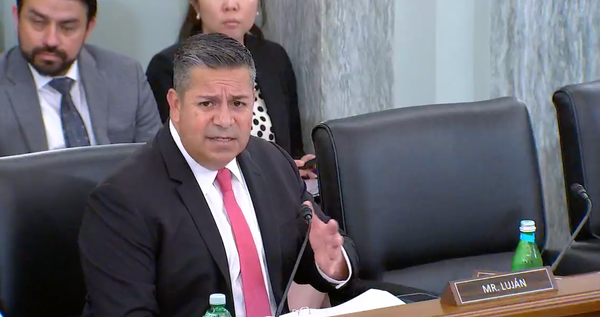Lawmakers Take Important Step Forward with Spectrum Pipeline Act
The introduction of the Spectrum Pipeline Act represents an important step toward attempting to restore the FCC’s auction authority.

Amidst recent headlines dominated by President Biden’s 2025 budget proposal and the passage of a major spending package, Americans can be forgiven if they haven’t heard about a new Senate spectrum pipeline bill.
However, this spectrum pipeline bill dubbed the Spectrum Pipeline Act of 2024, could have far-reaching consequences for America’s leadership in the spectrum landscape. Congress would be wise to consider its merits.
Introduced early last month, the Act addresses the immediate need to restore the Federal Communication Commission’s spectrum auctioning authority and establish a robust pipeline of mid-band spectrum for both licensed and unlicensed commercial uses.
Neither issue is addressed in the Biden administration’s new National Spectrum Strategy (NSS). This makes their inclusion in this bill all the more important for establishing a comprehensive U.S. spectrum policy that is pro-consumer, technology-neutral, and tackles the growing need for more commercial spectrum.
First, the Act would reauthorize the FCC’s auction authority through September 30, 2027. For more than a year, the FCC has been unable to host spectrum auctions, where commercial providers can bid on exclusive access to specific radio frequencies necessary for building wireless networks and unlocking consumer benefits. As the American Consumer Institute has previously noted, these auctions play a vital role in distributing spectrum licenses in a manner that is both fairer and more efficient than the old system of “hearings and lotteries” which were, in many ways, glorified beauty pageants.
They also serve as a major source of government revenue. Over the last 30 years, FCC auctions have generated more than $233 billion for the U.S. Treasury. That’s money that can be used to fund government programs and services, such as the Affordable Connectivity Program, which is in desperate need of a cash infusion.
A much-needed pipeline for mid-bad spectrum
Second, the Act would establish a much-needed pipeline of mid-band spectrum. For too long, America’s spectrum pipeline has sat empty, putting the future of commercial investment and subsequent technological innovation in unnecessary jeopardy. This Act attempts to remedy the situation by directing the National Telecommunications and Information Administration, in collaboration with the Commission, to identify at least 2500 megahertz of spectrum in the 1.3 GigaHertz (GHz) and 13.2 GHz bands, a critical range of mid-band frequencies for commercial use.
This includes 1250 megahertz of spectrum for full-power commercial wireless services, 125 megaherz for unlicensed services, and the remaining 1,125 megahertz for either licensed or unlicensed technological uses.
It is well documented that America faces a critical shortage of licensed mid-band spectrum. The band’s unique mix of speed and geographic coverage makes it highly coveted and perfect for American 5G and future 6G networks and the wide range of goods and services they make possible. Unfortunately, surging demand for this precious resource is threatening to outstrip supply.
Equally troubling is that the U.S. also appears to be falling behind the rest of the world in allocating licensed mid-band spectrum. While the U.S. has traditionally been a leader in this area, it now lags behind other developed nations by an average of 200 megahertz, with that gap expected to grow in the years ahead. This puts America at a competitive disadvantage in setting future technical standards and enjoying first-mover advantages associated with investing in new technologies.
Creating a concrete timeframe for completing the task
The Act attempts to set things right by repurposing more mid-band spectrum for licensed use. Importantly, it also establishes a concrete timeframe for completing this task. For instance, within two years, the Commission would need to identify the 1250 MHz of spectrum for licensed use, and within three years need to hold at least one auction for no less than 600 MHz of spectrum. The Act has similar time stipulations for the remaining 1250 MHz of spectrum.
Last, the Act not only identifies more spectrum for licensed use but for non-licensed use as well. A common disagreement between various commercial stakeholders is whether more spectrum should be repurposed for licensed or unlicensed use. The Act gets around this issue by taking an all-the-above approach to spectrum allocation that prioritizes American leadership in the 5G and Wi-Fi space.
In addition, while requiring that the NTIA identify spectrum bands within the 1.3 GHz and 13.2 GHz mid-band range, the Act does not spell out precisely what bands the NTIA must identify. This provides the agency with the flexibility that it needs to strategically select the bands that build upon its NSS and produce the greatest impact for the commercial market.
While Congress may or may not ultimately choose to move forward with the Spectrum Pipeline Act of 2024, the introduction of the bill alone represents an important step toward attempting to restore the FCC’s auctioning authority and free up more spectrum for commercial use.
Both are critical needs that the U.S. cannot afford to continue to ignore, and lawmakers deserve praise for attempting to address them.
Nate Scherer is a policy analyst with the American Consumer Institute, a nonprofit education and research organization. For more information about the Institute, visit us at www.TheAmericanConsumer.Org or follow us on X @ConsumerPal. This piece is exclusive to Broadband Breakfast.
Broadband Breakfast accepts commentary from informed observers of the broadband scene. Please send pieces to commentary@breakfast.media. The views expressed in Expert Opinion pieces do not necessarily reflect the views of Broadband Breakfast and Breakfast Media LLC.









